- Home
- Adam Thorpe
Voluntary
Voluntary Read online
CONTENTS
Cover
About the Book
About the Author
Also by Adam Thorpe
Dedication
Title page
Impression
Sutton Hoo
Home Videos
Sighting
Fuel
Power
Spring Class
Elsewhere
Disaster
Niagara
Jäääär
Badger
Mythos
In the Park Again
Writer
Holbein
Underground
Second Homers
Via
Interior with a Young Man Reading
Alcalá
Vessel
Summing Up
Clearing Your Study
Extreme Unction
Unfinished
Remembering my Father
Full Moon in Summer
Telling You About Kribi
The Gift
Posy
Flaubert’s Drafts
Neighbour
Dry Stone Walling
Subtraction
In York Minster
The Swimming Pool
Half Century
On a Photo of a Wainwright’s Shop
Reprieve
In Bed
Panic
Checking Blood Pressure
Marginalia
In Court
Punctured
Roads Themselves Are Silent
Voluntary
Acknowledgements
Copyright
About the Book
From an abandoned rowing boat in Estonia full of wild flowers to a swimming pool in the Congo full of drowned insects, Adam Thorpe’s new collection takes us on a wide-ranging journey through states of gain and loss, alienation and belonging. In the title poem, the poet disturbs a flock of geese by his mere presence, and one goose takes the wrong direction, away from the flock, as a ‘voluntary exile’. A bid for freedom, or a mistake?
These poems explore our chances, record our traces – in the marks on skin, home movies, stone walls, the pressure of our blood, or the clearing of a dying father’s study: ‘foraging backwards’ until something is revealed, however tentative. As always in Thorpe’s work, history’s violence lurks in the margins: in the silent oppression of Roman roads, a polluting pipeline in Africa or the bombing of the Alcala train, he takes the gauge of our wider compulsions, of all that decides things for us. Against this he sets what, through the other meaning of ‘voluntary’, suggests chance’s extempore music: the gleeful play of a sea-otter, the extraordinary gift of a passing gull to his small daughter, or poetry itself.
Adam Thorpe is now celebrated as a novelist, but he began as a poet. Voluntary, his sixth collection, is a timely reminder of the elegance, skill and remarkable range of this most gifted English writer.
About the Author
Adam Thorpe was born in Paris in 1956. His first novel, Ulverton, was published in 1992, and he has written nine others – most recently Flight – and two collections of stories. His new translation of Madame Bovary has just been published by Vintage. He lives in France with his wife and family.
ALSO BY ADAM THORPE
FICTION
Ulverton
Still
Pieces of Light
Shifts
Nineteen Twenty-One
No Telling
The Rules of Perspective
Is This The Way You Said?
Between Each Breath
The Standing Pool
Hodd
POETRY
Mornings in the Baltic
Meeting Montaigne
From the Neanderthal
Nine Lessons from the Dark
Birds with a Broken Wing
TRANSLATION
Madame Bovary
in memory of John Fairfax
VOLUNTARY
Adam Thorpe
IMPRESSION
The pawprint, bedded on the Roman tile
our late neighbour bequeathed us,
is deep enough, even on a roof’s pitch,
to pool rain as petals do
or to take a cast from, revive
the rough pads that time would have tossed away
if the dog had never trotted across
those flat, glistening squares of clay
laid to dry on the sun-bright turf
at the back of the works …
or hopped rather, for the paw’s impress
is unaccompanied, its claw-dots risen
at the sides like fork pricks in dough.
I like the back of the tegula, too, those arrested
shadows of grass and grit: the earth’s muddle
just as it was, two thousand years ago –
the shabby mongrel, lamish, yelled at;
the jobsworth muttering as he crouches down,
It’ll still keep the rain off. It’ll do.
SUTTON HOO
The Overflow Car Park’s empty,
the light a lustrous grey on birch.
The local farmer’s cut his turf
right to the ligeance, so it’s just this corner,
discreetly fenced in wire. A spellbound
darkness of firs at the field’s edge.
Several shaggy swells: which one?
With history’s mood-swings it’s hard
to tell. There’s gold for some, though;
while my sense of nation’s less a buried crown
than a stain of post-hole, or this viewing
rostrum I try to work things out from.
HOME VIDEOS
We run them all through in a glut
on the veteran machine, wincing and laughing
at what never resembles who we think we are
or thought we were, for everything is chafing
not to remain, not to get caught in the rut
we’d quite like to stay in, now we are here.
And everyone is still alive;
it’s all a lie, death is. The shock of the young,
although we did not feel young then. Our wonder
that the boys could ever not have been strong
men accompanies our surprise at their five-
year-old sister sticking her tongue out, stealing their thunder
over ten years off from where we are,
like a nearby star. Explorers of the Amazon
in a garden we hardly recognise (their cabane
of sticks and fruit crates long in oblivion),
these children were definitely ours, turn and stare
and make faces, as if we’re the ones that should run
away in pretend fright,
seeing how fast the passing birthdays go,
so resembling each other – the off-camera burst
at a joke that has vanished forever, the slow
lighting of the candles that refuse to light,
the pinned donkey’s tail in focus at last.
It keeps the detail, unlike
memory. Whole swathes obliterated in between
cannot be loaded and screened, we know. This
is the only stake that’s held, and time is mean,
and it always stops mid-show, like a lightning strike
followed by a blizzard – and this triumphant hiss.
SIGHTING
Of course we were always meant
to watch its slicked-down head
appear and reappear in the Sound’s
rocky inlet beyond the lane’s
verge at dusk; but whether
it feeds or plays or is simply
luxuriating in the violet
gloom and glitter of the sea
after its den’s blind room
we have no idea, knowing
next to nothing about any creature.
It vanishes only to be
repeatedly spotted – allotted
half-an-hour of our lives
before the excitement palls
and the binoculars are left
on the sill, no longer fought for. What
doesn’t, in the end, become familiar
all round, however strange or fine?
I wish that sea-otter’s amazement was mine.
FUEL
She has to store five tons
to see through winter. I offer
her a hand, but she waves her own.
She’s carrying just a few a day
from where they were delivered
to the shed: twenty yards. It’s early May.
That’s a lot of holm-oak
(heavy, slow to combust). She’s seventy-odd.
It keeps her young, she jokes.
The next time we go past,
cep-hunting in November, there’s
no dog, no greeting, just
a sheer cliff of logs in the shed
and a few scattered on the grass.
She never used a wheelbarrow, I said.
Two years on and the stack’s
still there, along with the dropped
ones, now furred with moss, and black.
Millennia ago they’d have made
a pyre against the greater cold
or carried the lot to her tomb’s shade
for time to consume.
Sufficient for the life after.
Or enough to resume:
this was the pith
of her, always ahead of the first frost.
This was her faith.
POWER
The worst done for the best reasons,
and vice-versa: they’ll stick out
a mile, bigger than your standard pylon,
the north coast’s sea-swell
wired to Edinburgh’s glare
down glen after glen, looping over braes.
It’s an ailment, someone said,
in a different context: this need
for power. A necessary
shot in the arm, says Scottish Cabinet:
yes, like the silken skin of that girl
punctured by needles to the wrist,
catching her blood on a terry towel.
SPRING CLASS
My students gaze soporifically as I fillet Plath,
intent on enthusing – like a star chef courting
the suspicion that an inch below the froth
he can barely fry an egg: un ignare, a fraud.
The cobbled court of the old Vauban fort
turns southerly with sunlight, enough to permeate
a long skirt. Inside it’s that winter in Fitzroy Road,
her avalanche of poems through inadequate heating
and the long freeze of ’63 that I
recall as a bout of sledging … being old enough,
at six. I see their fingers subliminally
summing my age, drawn by this MacGuffin;
their mouths now open in surprise – much more
than when I lift the lid on her suicide
(the kids asleep, the milks, the new au-pair).
Or that is my impression. And what’s really hiding
behind the steam of words is a lost reference
to my brother and I as we squeal down the track’s
schillerised slope … to swerve into the fence,
snapping a runner, the snow sharp as axes
under its feathery asbestos fluff: look,
it’s spotting with the excitement of my cut chin, my red
smudge of courage. Amazing, after the earthquake
of it all, to find I am here in class, instead.
ELSEWHERE
Käsmu, Estonia
The thunderous jet-sigh of coastal pines,
the midnight length of wolves, grandmothers
buried the far side of those massive boulders
geologists term ‘erratic’, brought there
as they were by a grinding of ice, left behind
like pebbles: here, I feel strangely at home –
right from the first time, when I came with the others.
And rather than settling in your northern folds,
the author of erratic, long-vowelled lines,
learning your secretive language to clear my mind,
tramping your woods, I’ll keep you as an elsewhere:
sidled up to now and again; always torn from.
DISASTER
We carried out an impact assessment
on their people’s grief;
flexed its brittleness,
broke it. Their sorrows were sorted,
its underlying causes mapped, made
respondent to emergent needs.
Tears were seen to leave lines
on their dusty faces
by our front-line team; we were not there
to invent the wheel, but to work
in collaboration with the necessary forces
for change, then move
the change forwards to another peg.
Carts rumbled over ruts
as we embedded behaviours,
made results tangible in the crowds
running like a wash of water in front of our bonnets.
The occasional spill led to a change
strategy, that sustainable and measurable solution
already described. When the phones went
it was only the phones – feedback
leaving its legacy, an effective
listening through the swarms of flies.
The magnitude of it all was a challenge
to our proven methodologies: they wept
when we left – buzzed and energised
by driving that evolution
for so many days, so many nights,
glad of home and of our own cries.
NIAGARA
1
It was not the infinite kilowattage
in the falling of the falls themselves
that most impressed, but the bouncing
top edge watched from the railed-off side:
that strange green water-dance
ledged against the sky, all that river-enthusiasm
colliding on the surprise of a vista of air –
as if God was suddenly to come across
His own absence, or that human trick
He’s never quite fathomed
called letting your hair down,
called letting everything go.
2
That industrial, uroboric roar
drowned our lines as we shouted in macs
behind a door of water in the rock,
preferring the litotes of not bad, hey?
to open amazement. The tunnels
hacked out of the cliff, puddled,
were like Dante’s Malebolge … while a single rock-fern
nodded outside on a slicked ledge, its garden-green
warded by the unbarrelling itself
from whatever lies beyond perpetual storm.
JÄÄÄÄR
That, in Estonian, it means ‘the edge of ice’
seems hardly a surprise:
the melting away of consonants,
the freezing of vowels into a howl. Once
the entire bay would be tundra from November;
now it’s slush, and snow something to remember.
I see that final r retreat to the ‘yuh’ sound
with less and less of that ice-bound
middle part I am incapable of pronouncing right
(the skater toppling, the fledgling’s first flight
too soon after winter), as if the Baltic’s lapping higher
till all that’s left’s a last, fish-hook cry.
BADGER
Each night at the
same time his shadow
crosses over below Verdeilles, glimpsed white
like a stripe of snow on a black bough:
lumbering unworried, with a vicious bite.
It’s the road that crosses the badger, you say –
his ancestry deep, the behaviour tied
to custom; the ancient setts concealed from the day,
each night’s an echo of the previous night
where we are the ones who interfere:
he just stands his ground. Were a car to appear,
all death and dazzle, he wouldn’t swerve, or wait:
his commitment’s grown in his blood, like fate.
Where his front paws go his back ones follow
in a visa’s double stamp, those claws’ high fives.
Droppings glisten in the small hollows
he digs here and there, so long from our lives.
He’d despise (if he could) the parasitic dogs
who behave as if we matter; or the surrendering rabbit;
or the others that use us, like the cat, the fox.
But only we can despise – out of long habit.
MYTHOS
In memory of Fred and Judy Busch
‘I hear mythos padding in the underbrush’
The brownstones still prop the wrought-iron gate
on Morton Street, 44A
no doubt the same old porcelain plaque
you’d pass with Judy
in those early Greenwich Village days
to reach your one-room, wooden,
eighty-four-dollars-a-month flat
back in ’63; you writing nights
on the edge of the bath, typewriter
poised on the toilet seat, icy air
and endless ‘heartbreak in the mails’.
And now you’re both passed away –
so abruptly gone I can’t help thinking
of that note you slipped
under my hotel door in Deauville
after we’d planned to drive to Omaha
Beach: The trip is too long. Fred.
It seems like only yesterday, of course,
that the machinery of friendship was oiled
and running – that we cared how
the other was and what they were doing
and where the goddamn books were going to
(‘The third Armagnac ought
to get it out of you …’), with our lives

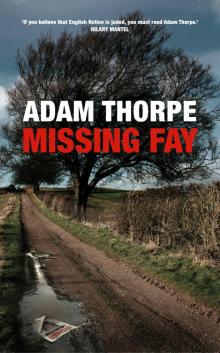 Missing Fay
Missing Fay Hodd
Hodd Pieces of Light
Pieces of Light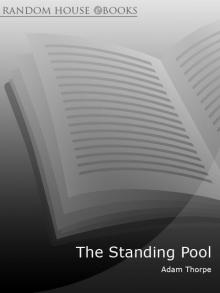 The Standing Pool
The Standing Pool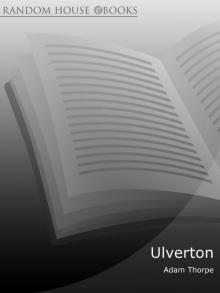 Ulverton
Ulverton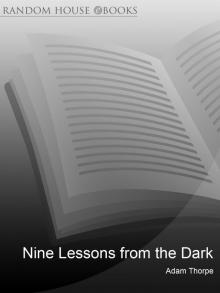 Nine Lessons From the Dark
Nine Lessons From the Dark Flight
Flight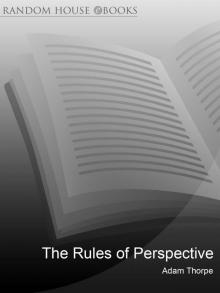 The Rules of Perspective
The Rules of Perspective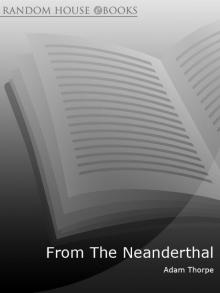 From the Neanderthal
From the Neanderthal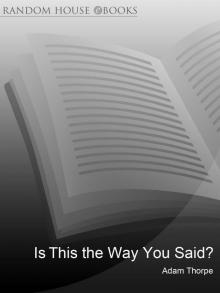 Is This the Way You Said?
Is This the Way You Said?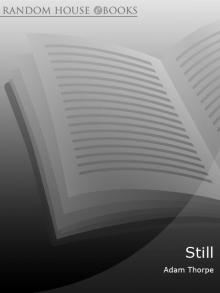 Still
Still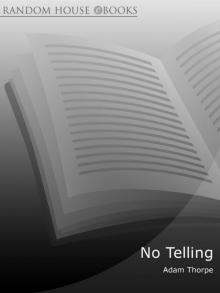 No Telling
No Telling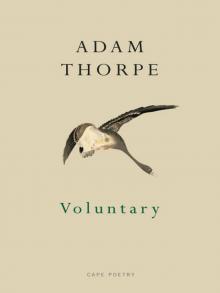 Voluntary
Voluntary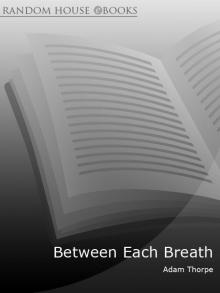 Between Each Breath
Between Each Breath